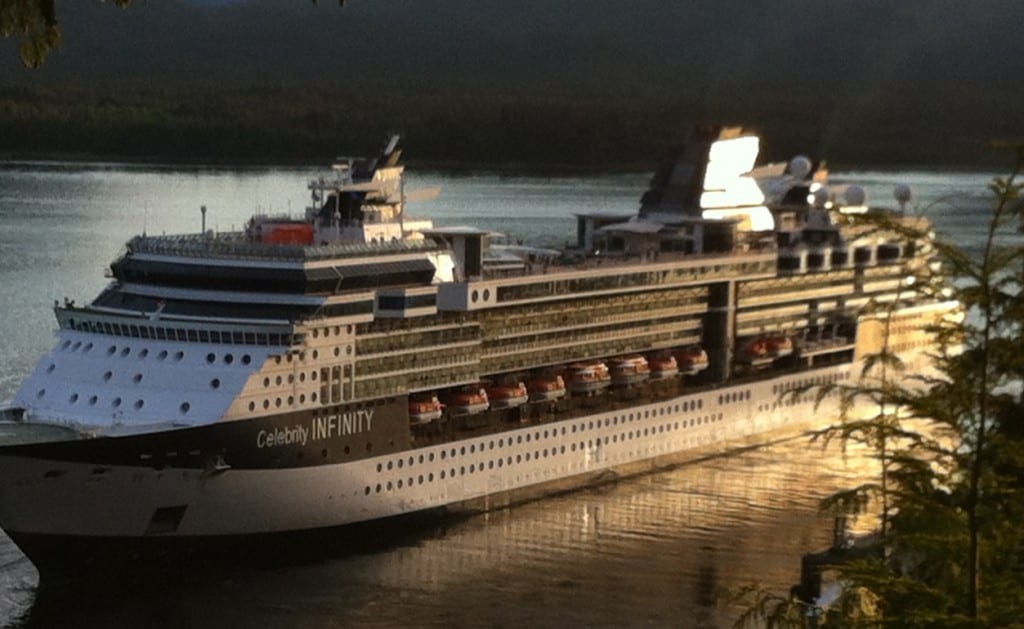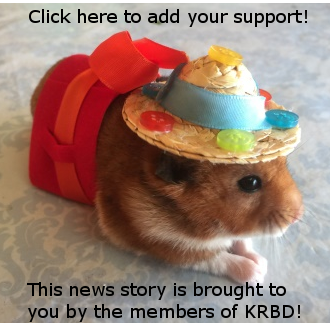
The cruise ship Infinity is seen leaving Ketchikan’s Berth 4 last summer. (KRBD file photo by Leila Kheiry)
The Ketchikan City Council voted Thursday to start negotiations with Ketchikan Dock Co. on ways to reconfigure Berth 4 of the downtown dock to accommodate larger ships.
Ketchikan Dock Co. leases Berth 4 from the city. That berth would be the easiest and least expensive of the city’s four cruise ship berths to expand, according to a study the city commissioned.
There were some concerns about expanding it, though. Some local business owners were worried about how the project might affect their waterfront properties.
Michelle Masden of Island Wings Air Service north of the berth said the current extent of that facility already makes it difficult at times to fly in and out because of thrusters creating eddies. Expanding the berth for bigger ships could make things worse.
“I bought this property in good faith. I’ve been a Ketchikan business owner for 25 years and I’ve put everything I have into this building,” she said. “I feel like I should be able to use it free and unobstructed. I paid a lot of money for it, I paid a lot of money to refurbish it and keep it in good condition. I work hard with my business and I feel like I deserve the property I bought.”
Council members agreed that local business owners who might be directly affected by the expansion should be included in the planning. Some on the Council also were concerned about allowing bigger ships, because the community might be at or near its limit for cruise visitors.
Council Member Janalee Gage noted an article she’d read about cruise ships that are allowed to dump wastewater even while docked next to communities. And bigger ships mean more wastewater.
Port and Harbors Director Steve Corporon addressed that concern. He said many ships can’t discharge waste anywhere in Alaska waters. Some of the ships with better treatment systems are allowed to release treated wastewater only when they are underway – creating their own mixing zones to distribute and dilute the discharge.
 The newest ships have much more sophisticated treatment systems on board. Those are the ones that the state allows to discharge continuously, including while they are docked.
The newest ships have much more sophisticated treatment systems on board. Those are the ones that the state allows to discharge continuously, including while they are docked.
“They use the best stuff. Filters, UV light. It kills everything,” he said. “And rather than having to wait until they’re underway going more than 6 knots, they’re allowed to discharge all the time, and that’s basically what they do. They don’t save it up and pump out treated water all at once. It kinda trickles out 24/7. So, while they’re in port, it’s still trickling out here. This discharge is very clean. It’s cleaner than anything our plants put out here. That’s why (the Department of Environmental Conservation) is permitting it.”
Corporon also addressed recent reports of high bacteria levels in water off Ketchikan beaches. He said the levels probably have always been high. They were just never tested before. Ketchikan Indian Community is conducting the testing for the state through a grant.
Corporon said he suspects the high bacteria levels are at least in part the result of fish processing discharge.
The vote to move ahead with negotiating changes to Berth 4 passed 6-1 with Gage voting no. Any negotiated plan must come back to the Council for review.
Also Thursday, the Council voted to officially protest a marijuana cultivation license application because the applicants had not completed some permit and tax filings. A hearing on the protest is scheduled for the Council’s regular Sept. 7 meeting.
In other matters, the Council approved an $867,000 contract with BAM LLC to replace the raw water mains that bring the city’s drinking water from Ketchikan Lakes.





